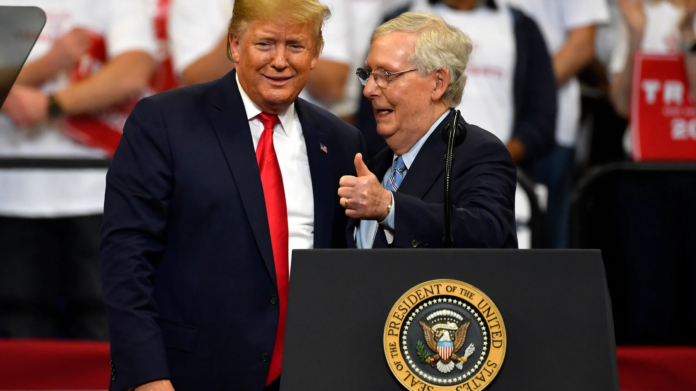The recent pivot of Senate Minority Leader Mitch McConnell represents a climax of political theater that would leave even the most seasoned observers agape. After a rollercoaster relationship with former President Donald Trump, marked by periods of both overt conflict and uneasy alliances, McConnell has made a move that seems to encapsulate the essence of his lengthy career: endorsing Trump for the Republican nomination after the latter’s triumph in the Super Tuesday contests. This act is the culmination of McConnell’s long-standing tradition of prioritizing political gain over principle, a maneuver that might just be his most defining legacy.
Behind the curtain, whispers of a negotiation between the camps of McConnell and Trump had been circulating for weeks, setting the stage for a political reconciliation that many would have thought improbable. However, this was overshadowed by McConnell’s announcement of his impending resignation as the GOP’s Senate leader this November, a move that ignites a power scramble among his would-be successors but also casts a shadow on his final days in office.
McConnell’s endorsement of Trump is not merely a political calculation; it is an emblem of his pragmatic, if not opportunistic, approach to power. This is a man who once decried Trump as “morally responsible” for the Capitol insurrection, only to later shield him from Senate conviction post-impeachment by rallying GOP senators. It’s a staggering juxtaposition to his past actions, such as his vehement pursuit of conservative judicial appointments at the expense of precedent and fairness, and a testament to his willingness to bend his moral compass in favor of political expediency.
Perhaps the most perplexing aspect of McConnell’s latest maneuver is the context in which it occurs. Trump, a figure engulfed in legal turmoil and ethical controversies, including being on trial for numerous felony charges and being found liable for sexual abuse, seems an unlikely candidate for endorsement from a seasoned political veteran like McConnell. Yet, McConnell’s silence on Trump’s escalating extremist rhetoric and assaults on democratic norms speaks volumes of his strategic silence, opting
to conserve political capital rather than challenge the falsehoods undermining the electoral system.
This strategy of silence and subsequent endorsement starkly contrasts McConnell’s previous stances, notably his vote to convict then-President Bill Clinton over principles of honor and moral authority. The discrepancy highlights a profound shift not only in McConnell’s approach but in the broader political landscape, where allegiance to Trumpism appears to trump (pun intended) all else, including the egregious personal attacks Trump has launched against McConnell and his family.
McConnell’s decision to back Trump, despite the barrage of insults and racial slurs directed at his wife, Elaine Chao, reflects a baffling level of political pragmatism that borders on self-abasement. This endorsement, seemingly a bid to secure GOP’s Senate majority, underscores a disturbing willingness to align with a figure whose actions and rhetoric have consistently undermined the fabric of American democracy.
As McConnell prepares to exit the political stage, the legacy he leaves behind is fraught with contradictions. His tenure has been marked by ruthless efficiency in achieving political aims, often at the cost of democratic principles and ethical standards. His final act of endorsing Trump, despite the latter’s litany of legal and ethical entanglements, serves as a poignant illustration of McConnell’s ultimate legacy: a testament to political survivalism that prioritizes power over principle.
The ramifications of McConnell’s actions extend far beyond his personal legacy, posing significant implications for the future of the Republican Party and American democracy. As the GOP continues to grapple with its identity in the shadow of Trumpism, McConnell’s endorsement signifies a pivotal moment of capitulation to the very forces he once seemed poised to temper. The question that looms large as McConnell exits the stage is not just about the legacy he leaves behind, but about the future of a party and a country wrestling with the consequences of his choices.
For the younger generations watching this unfold, the tale of McConnell and Trump is more than a political drama; it’s a call to action. It serves as a stark reminder of
the importance of integrity in leadership and the perilous consequences of valuing power over principles. In an era where the lines between political expediency and ethical governance are increasingly blurred, McConnell’s legacy is a cautionary tale of what happens when the scales tip too far in favor of the former.
As we look ahead, the challenge for millennials and the generations to follow is not just to critique the shortcomings of leaders like McConnell but to envision and enact a new paradigm of political engagement that elevates integrity, accountability, and a commitment to democratic values. The story of McConnell’s endorsement of Trump, with all its contradictions and consequences, underscores the urgent need for a political renaissance that reclaims the core values that should define our democracy.
In the end, McConnell’s legacy, marked by this final act of political calculation, serves as a powerful impetus for change. It’s a reminder that the future of American democracy lies not in the hands of those who maneuver for power at any cost but in those who are willing to stand up for the principles that truly make America great. As we move forward, let this moment be a catalyst for a new generation of leaders who are ready to build a future grounded in these values, ensuring that the lessons learned from McConnell’s tenure inform a brighter, more principled path ahead.



